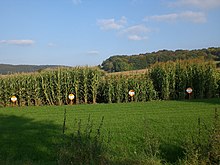Field trial

In agriculture, a field trial (also called a parcel trial ) refers to the creation of a small field by testing various factors such as B. seeds ( varieties ), crop protection or fertilization .
Every year the chambers of agriculture test different types of grain in their regional variety trials in strip trials with different uses of plant protection and fertilization measures. Due to the large number of measures, the respective area must be limited to a few square meters in order to avoid differences in results due to different soil conditions. They are criticized because they are tested on the same areas every year. In addition, the tests are labeled long before the results are determined and manipulations are therefore possible at any time.
See also
literature
- Eilhard Alfred Mitscherlich : Regulations for setting up field tests in agricultural practice . Paul Parey Berlin 1919; 2nd edition 1925.
